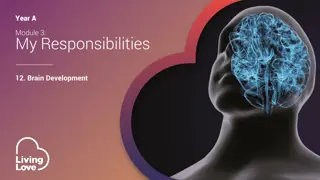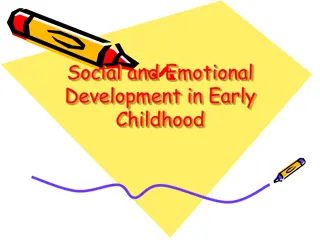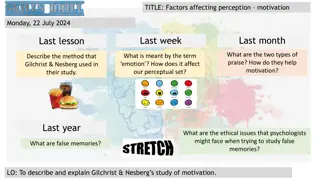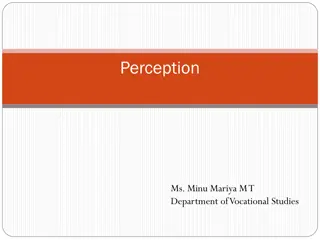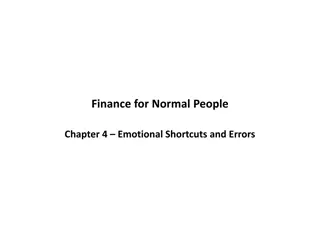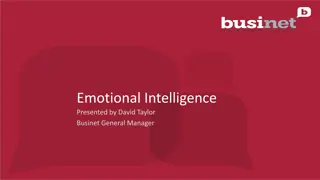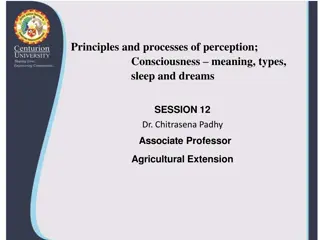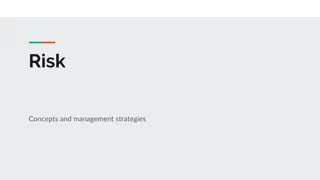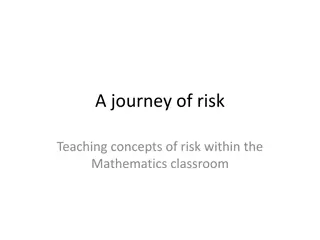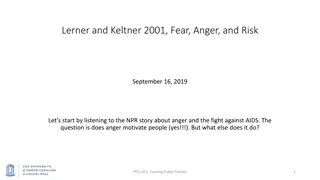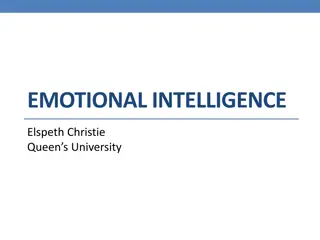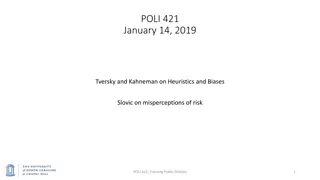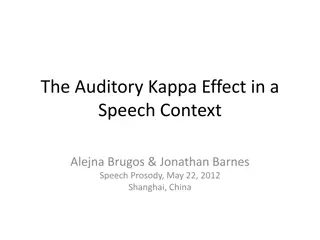Emotional Influence on Risk Perception and Decision-Making
Understanding the impact of emotions such as fear and anger on risk perception and decision-making is crucial. Research shows that fearful individuals tend to overestimate risks, while angry or happy individuals underestimate risks. Emotions influence not only our immediate responses but also persist to affect behavior in unrelated situations. This insight has implications in various areas, including public policy framing and commercial strategies.
Download Presentation

Please find below an Image/Link to download the presentation.
The content on the website is provided AS IS for your information and personal use only. It may not be sold, licensed, or shared on other websites without obtaining consent from the author.If you encounter any issues during the download, it is possible that the publisher has removed the file from their server.
You are allowed to download the files provided on this website for personal or commercial use, subject to the condition that they are used lawfully. All files are the property of their respective owners.
The content on the website is provided AS IS for your information and personal use only. It may not be sold, licensed, or shared on other websites without obtaining consent from the author.
E N D
Presentation Transcript
Baumgartner, Framing, Spring 2023 Lerner, J.S., and D. Keltner. 2001. Fear, anger, and risk. Journal of Personality and Social Psychology 81, 1: 146 49. Aizenman, Nurith. 2019. How to Demand a Medical Breakthrough: Lessons from the AIDS Fight. NPR.org. February 9. Jan 30, 2023 Let s start by listening to the NPR story about anger and the fight against AIDS. The question is does anger motivate people (yes!!!). But what else does it do? POLI 421, Framing Public Policies, Spring 2023 1
Lerner and Keltner 2001, Fear, Anger, and Risk Fearful people Pessimistic about risk (over- estimate the risk of things) Angry people Optimistic risk assessments (under-estimate risks) Risk-averse choices Risk-seeking choices When you are peeved, you take risks. When you are scared, you do not. (also: Happy people do this as well) POLI 421, Framing Public Policies, Spring 2023 2
Background research / literature Change people s mood: change their behaviors Induce positive or negative moods / emotional states: Changes your estimates of the odds of various things happening. Happy bouncy music might make you go ahead and buy something. Droopy, dreary, black, depressing stuff makes you expect the worst. Does that strike you as right? Do politicians do that to you? Manipulate your mood? Do commercial establishments attempt to do the same? POLI 421, Framing Public Policies, Spring 2023 3
Emotional response makes sense, but persists: First, we assume that emotions trigger changes in cognition, physiology, and action that, although tailored to help the individual respond to the event that evoked the emotion, often persist beyond the eliciting situation (p. 146) Implication: emotional state goes on to affect behavior even in response to objects or events that are unrelated to the original cause of the emotion. Like a priming effect. What if you happen to see a snake just before you go to buy a car? It might put you in a fearful mood for the rest of the day, and that could make you become financially conservative. Hence: no snakes in the car dealership! (Am I right?) That is, the emotional effect does not wear off when the situation is over POLI 421, Framing Public Policies, Spring 2023 4
Fear and Anger. You determine your anger, and are sure of it. Fear is the opposite. Fear Control: situational Anger Control: individual Certainty: low Certainty: high POLI 421, Framing Public Policies, Spring 2023 5
Their results, several different studies Fearful people Pessimistic assessments of the odds of future events Angry and / or happy people Optimistic assessments of the odds of future events Pessimistic, risk-averse choices . Optimistic, risk-acceptant choices . They think they have no control. They think they are in control. POLI 421, Framing Public Policies, Spring 2023 6
Explicit and Implicit Attitudes Implicit attitudes: mental associations, linkages, gut feelings Explicit attitudes: validation, invalidation of these feelings through conscious thought. Anger makes you more certain Being more certain makes you give more credence to your gut feelings POLI 421, Framing Public Policies, Spring 2023 7
Does that strike you as valid? Do you see in public life people manipulating anger? Do angry people seem to act more sincerely? Let s put it another way: If you were trying to dissemble your true feelings, and act in a way that was PC or that you knew was right, but just did not feel comfortable with it, would you want to be calm, or angry? Being calm, you can better control your thoughts and decisions. Being angry, you are more likely to reveal your true self. True? POLI 421, Framing Public Policies, Spring 2023 8
OK, lets talk about what this means in advertising and in marketing What product salespeople would want to build up your fear, make you feel that you are NOT in control, but buy their product to protect yourself from risk? What product salespeople would want to build up your happiness, make you feel in control, so that you would buy their product even if you can t afford it? (e.g., take a risk) What about anger? Do advertisers use anger as well? In politics and public policy? What motivates people to vote, to join a protest, to get involved, to run for office? POLI 421, Framing Public Policies, Spring 2023 9
Same questions with public policy framing What policies would be supported more if we enhance fear and sense of no control? What policies are enhanced if people have optimism, happiness? What are the impacts of anger? Who can you remember manipulating fear? Anger? Give examples. POLI 421, Framing Public Policies, Spring 2023 10
How does anger motivate people in politics? Hunker down and withdraw, or mobilize and fight? Lots of social movements use anger and a sense of outrage to build support: Mothers against drunk drivers But fear can work well too: crime policies are often driven by irrational fears. POLI 421, Framing Public Policies, Spring 2023 11



